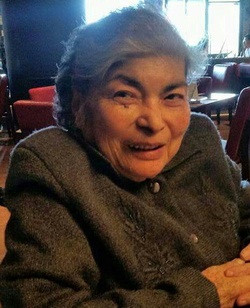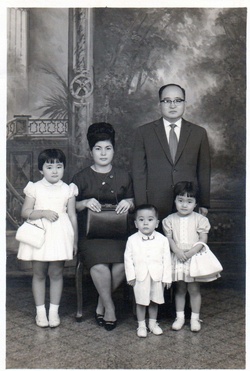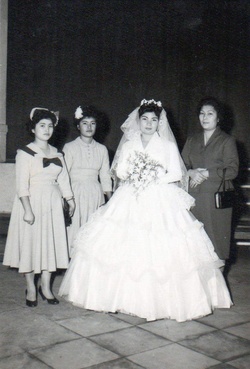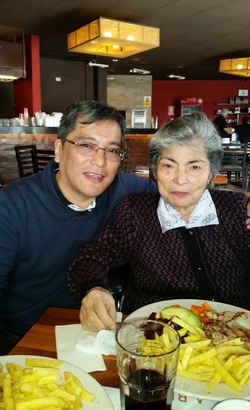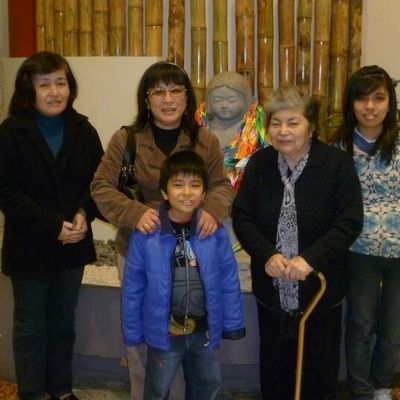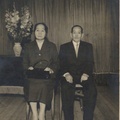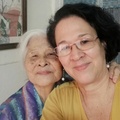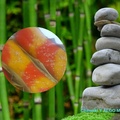In every home, the role of the mother is little recognized, that is where she becomes a superwoman. One says that all women are equal, but we see something exceptional in the Nikkei woman, so many words to say: strength, drive, hardworking, humility, let us believe that we men are the basis of the family. It is only when one is of a certain age that one begins to reflect on everything. I see the women in my family, each one has a story of sacrifice, they always respond to the most difficult situations: the “obá” (grandmother), the aunts, the cousins, my mother, my mother-in-law, my wife, my sisters, friends, in short, all of them. Personally, I have found myself supported by some of them, without knowing how I could have gotten out of those situations without their support.
This is part of my experience and this is only part of my mother's story. She was a woman who was not even five feet tall, but she was immense in strength, she was proof of everything, how many memories, sufferings, tears; But, he always went forward, he did not give up, always thinking that things were going to be solved, he did not go back.
I remember when my dad got sick, he was diabetic. He had a simple nail on his foot, it became infected and turned black. Just after he told my mother, she accompanied him to the “Hospital Dos de Mayo”, a hospital in Lima, for the poorest. At that time our situation was difficult and everything happened so quickly that he was admitted to the emergency room to evaluate his situation. Due to the infected diabetic foot, the decision was to amputate as far as it had progressed.
My mother did the respective procedure and while she was doing it, a doctor asked my father if he knew that they were going to perform an operation and that they were possibly going to amputate his toes. My father refused and wrote a letter refusing to have the operation. My mother, after doing all the paperwork, was surprised to find that the doctors informed her that they were no longer going to operate on him. He asked why? They told him: “the man has refused and signed a letter.” Everything that can happen in a person's head and not measure the consequences. That caused everything to be delayed, to do another procedure, to sign a letter of responsibility from the family, so that when they operated on him, the disease had already advanced: they cut off his leg up to the knee.
I remember that my mother went to the hospital every day, from very early on. In the morning the round of doctors came, they presented a report and the daily prescription. She would run to the hospital pharmacy or have to go out to look for what they ordered, which was the most common because hospitals have the lowest prices, but they are out of stock. She would leave him with the nurses and before noon she would run to the house, which was close to the hospital, cook very quickly so that my sister would have lunch and then take my lunch to the store. Then she returned to the hospital in the afternoon, at visiting time, accompanied by one of her sisters. This was the case for more than forty-five days, after which my father left.
In hospitals, the hospital load exceeds the capacity, so many times they prefer that family members come to help care for the patients, they cannot cope. My mother, many times, had to support my father's weight to transfer him from the bed to the couch or for anything else he needed. My father had entered a state of depression and was not helping to do things and the nurses, because they were busy with so many patients, took a long time and my mother became desperate. Sometimes a technical assistant helped my mother. Over time, she grew fond of my mom and dad. Later, she was the one we hired to take care of my dad at home.
But, each thing has its consequence; My mother started having pain, she said they were muscular and she used creams and rubs. We told her that one of us would replace her; But, she said no, that we in the store were going to help more because we needed the money. They were bad times, that's why we had him in the hospital; But, money was spent anyway. She didn't complain about anything, she spent forty-five days in the hospital, although the pace slowed, until my dad was stable. To take him home, they waited until the amputation wound was completely closed. Everything was more bearable with the support of family and friends.
The Nikkei have very solid values regarding family, my mother was always accompanied by one of her sisters, every day. That ritual was always repeated, every time someone in the family got sick or needed help, the brothers were seen together, always supporting each other. That surprises me a lot and it may be because, despite being orphaned and not living together, the union was very solid, they always helped each other.
The consequences came later, she began to be checked and they discovered osteoporosis and osteoarthritis in her shoulder. He needed a hip replacement, but he never had surgery, plus he had a fracture in his spine, which surely caused him a lot of pain. The doctor told me they were old fractures and that was probably why I often had pain in my lower back. All the effort she had been making made her worse, she carried my father to go from the chair to the bed, when one of us was not there; We had to hire the nursing technician who helped my mother in the hospital.
With my mother, many years later, before she died, we had long conversations, telling me everything that happened in her life. He told me that, when my father had surgery, it was at night, very late. Sometimes they scheduled at that time by arrangement of the doctors and the surgery rooms. She was accompanied by her sister, she did not want me to go, she told me “they are not going to let you in, we will manage” and “when he comes out of the operation, I will call you to pick us up.” The place was the emergency zone, in front of Aviación Avenue and it was previously “Tacora”, a place for “cachineros”, homeless people, and thieves. He told me that they were in the living room in front of a television. She was restless, my aunt was distracted, she saw the doctor leaving, she caught up with him and talked to him. He told him that it had gone well and that he just had to wait for it to stabilize and that he didn't think there would be any problems; But, she saw the doctor leave with a plastic bag, where he took my dad's leg to analyze it. “I shuddered,” he told me. I don't know how to tell you what I felt, sadness, anger, I felt something all over my body; so many things that my mom kept for years.
My father lasted a little more than three years, the situation remained the same, many medical expenses, whenever possible we did it privately. It was difficult to move my father, my mother could no longer handle him, but we had a nurse, a technical assistant. My mother, with great difficulty, did the housework, but she wanted to do it. My dad was deteriorating more and one day we had to call the emergency doctor, who said “he has to be hospitalized.” I saw desperation and perhaps resignation on my mother's face. She could no longer move around easily and I knew that this time she would not be able to accompany my father. She probably thought she was going to lose him. I'll take care of it, I told my mother. , that time she had to be a spectator, waiting every day when she returned: How is the old man? she asked. I told him more or less. That time everything was a little easier, we had cultivated a friendship with the doctor at the Dos de Mayo Hospital, who later became deputy director.
Every time he came to the house privately, he would talk to me, preparing me for everything, he would tell me: “we no longer have to be rigid in everything, let's let your dad live the rest of his life in peace, it's better to give him quality.” of life, we already see the medical part on the way.” We admitted him again to the Dos de Mayo Hospital, this time I was the one who had to take charge, he came in as an emergency to stabilize him, they transferred him to the ward, but the hospital went on a doctors' strike and later in some other areas. The care became more difficult, he must have been hospitalized for two weeks and the treatments had no effect. He was admitted for pneumonia and they applied stronger and more expensive antibiotics each time, and the disease did not subside. Finally, while in the ward, they told me that my father was going to be transferred to “intermediate care”, his oxygenation was becoming less and less: “you know how serious your father is, we moved him to intermediate care and with little chance, it They are going to intubate and then they are going to decide what is going to be done”, he only told me to entrust myself to God, that it was difficult to do something for him.
The technician who took care of my father day and night in the hospital accompanied me; I slept sitting next to him. They had called us to a room where only the doctors were there, I listened to them and I already knew that this was going to happen, the end was approaching (I am led by premonitions, but it is difficult to accept it). I had spoken with his doctor and, although it is true that he had not told me what I had, I was preparing myself, except that those ward doctors said it crudely.
The technician who had become fond of my father, began to cry silently, came to my father's bed and began to fix him, looking at him and letting out tears. I was surprised by this, she didn't realize how serious it was and she had blind faith that my dad would leave the hospital to return home and that had been a splash of cold water. Apparently that affected her because she then looked for another job, she no longer wanted to get involved with a patient in that way. I would think that it had to be colder and that it shouldn't affect him.
When they moved him to “intermediate care”, the visits were more restricted, they happened at a moment's notice. You talk to people who are in the same situation, they give you encouragement, they advise you, one of them told me why I didn't apply to have him transferred to intensive care. He told me: “It's going to cost him, but they can save him,” so I went to find out, but the response was cold: “You know how serious your father is, you should talk to your doctor. He gave me to understand that they were just waiting for what had to happen to happen” and he told me: “those who have a chance of surviving go to intensive care.” The intermediate care room was close to the emergency room, there is nowhere to sit in that place, the waiting room is a little far from there, but I wanted to be close.
I remember that I bought a package of cookies because I had to eat something, I had sent the technician to go home and rest a little, we couldn't be inside anymore. She refused, but I insisted and in the end she left. I sat on the floor to wait, there was nowhere to do it, while I did it I remembered everything, I was tired, stressed, sad, with opposite feelings, my logic told me that I had already suffered enough and that I should rest, but one is always selfish and wants to have it for oneself, even though we may only prolong the suffering, how was I going to tell my mother, how would I face it.
My sister, who clung to my father's life, the doctors told me that if she got the medication they would apply it to her, but they always said that there was no hope, due to her age and other factors. The truth is that I had already given up on that case, perhaps I am colder. My sister visited all the known pharmacies, they told her that she would surely get it at a hospital very far away. And she left even though the place was dangerous, I left her, it was her own fight, she didn't succeed, but she had to do it until the end.
I saw myself in my mind going through everything I experienced with my dad, joys, sadness, fights that were never lacking when I was younger, until I reached the present at that moment. My mother had done what she had done before, in the hospital, only I shared it with my sister and my wife, I was amazed at how she had done it alone, it was twice as long, she ran from one place to the other all day , returned home to make lunch, suffering from pain, but remaining silent, enduring. Being healthy, younger, I thought about where I got so much energy from. I ended up crying, giving myself a license, alone without witnesses, thinking that my mother already knew what the end was, days before she had told me: “your father, before being admitted, told me that his brother had come to see him and that he was leaving.” go with him. His face was anguished, because he had already died, he came to pick him up, he told me.
Finally he died, due to sepsis, a generalized infection, my mother took it better than I imagined, that's the extent of her strength!
© 2017 Roberto Oshiro Teruya


